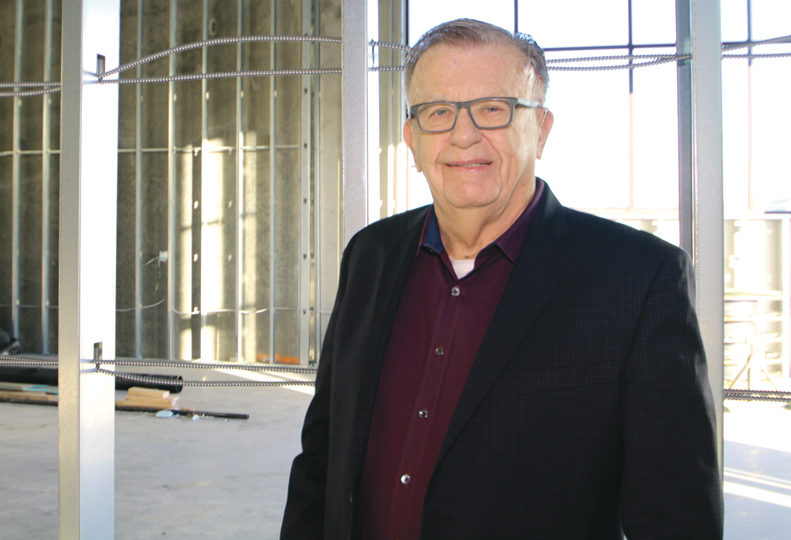
Remembering: Spokane developer Harlan Douglass
Magnate credited with building billion-dollar empire ‘from nothing’

Harlan Douglass is shown here in 2019, when he was named one of a Journal of Business Icon.
While Harlan Douglass had a reputation as a tough and controversial businessperson, the Spokane man who built a billion-dollar real estate empire was “just a normal guy” to his friends and occasionally enjoyed a good prank, even if it was on himself, says Steven Hassing, longtime friend, attorney, and former business partner.
Douglass died early Nov. 26 at the age of 86. He and his wife Maxine, who died in 2016, had amassed holdings that included owning, constructing, and leasing over 250 commercial buildings, about 2,000 apartment units, and several self-storage complexes across Washington, Idaho, Montana, Oregon, Utah, California, and South Dakota.
Hassing says that one of Douglass’ closest friends and earliest business collaborators was David Heerensperger, a Spokane businessperson who led the Pay ’n Pak home improvement chain and later founded Eagle Hardware & Garden Inc.
“Dave was instrumental in getting Harlan on the path to becoming what he was,” Hassing says. “Harlan would buy land and build on it to lease back to Pay ’n Pak or Eagle Hardware.”
In all, Douglass erected and leased 17 commercial buildings that he leased to Heerensperger-led companies.
Heerensperger died in late 2018.
Douglass also was close friends with fellow Spokane businessman Vern Ziegler, founder of the Ziegler Lumber chain known as Ziggy’s.
Ziegler, who died in late 2018, and his wife Mary even set Douglass up with Maxine Hilby, who he would marry in 1959.
The Douglasses raised three children: daughter Stacey Douglass Boies and sons Harley Douglass and Lanzce Douglass, all of whom have been involved in separate construction and development companies.
Hassing says Harlan Douglass was never one to show off as his holdings steadily grew. “He didn’t want to play the part of a big shot. He was just a normal guy.”
One of Douglass’ personal pursuits involved physical endurance events, such as marathons and triathlons.
Hassing, Douglass, and Dick Vandervert, a prominent Spokane developer who died in January, sometimes trained together in the early 1980s for such events.
“Harlan was just a jokester, and he played a couple of tricks on us,” Hassing recalls.
One day, while on a long bike ride, the three stopped for a rest near a pile of bricks, where Vandervert and Hassing spotted an opportunity for some payback. Vandervert distracted Douglass, while Hassing slipped several bricks into a bag on the back of Douglass’ bike.
“When we got to the first hill, he was sweating and couldn’t keep up,” Hassing says. “We made him ride about 30 miles with those bricks.”
Douglass could take a joke as well as dish one out, Hassing says. “He thought it was pretty funny. But then we had to watch out for him.”
All fun aside, Douglass was a tough businessperson and hard bargainer, Hassing concedes. “That’s how he became a billionaire from nothing. He didn’t do that by being a softy.”
Douglass was focused on accumulating land, building on it, paying it off, and using the income to buy more land for building, Hassing says. “He got to the point he could buy land with cash and build buildings with cash and lease the buildings to get more cash coming in.”
Douglass always kept his word, and he expected anyone he contracted with to do the same, Hassing says. “When they didn’t, he took steps to hold them to their word, and he made a few enemies.”
Douglass didn’t talk much to the press. In a rare interview with the Journal in 2019, he recalled among his accomplishments, developing the Southgate shopping center in 1980 at 44th and Regal, on what was then a largely undeveloped area of the upper South Hill.
He also said his developments were the first to bring Alberstons grocery stores, PayLess drug stores, 7-Eleven convenience stores, Taco Time and Taco Bell restaurants, and Radio Shack retail outlets to the Spokane market.
Along the way, Douglass had a few infamously acrimonious dealings with the city, and often asserted that Spokane was a difficult jurisdiction to work with.
“They sued me 13 times,” he claimed about the city in the Journal interview. “I won 12 1/2 times.”
At one point in 2003, Douglass posted an electronic sign on the West Side warning Seattleites not to expect a business-friendly climate in Spokane.
While not all of Douglass’ plans came to fruition, he wasn’t one to accept “no” for an answer, Hassing says.
“He never took a setback in stride. He would put plans in his back pocket and fume about it for a while, but he had plenty of other projects to move on to,” Hassing says.




